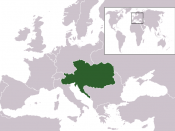In each country in 1848 there were disturbances in peace. All had their social, economical and political problems, even though they different from country to country. The aims of the revolutions are different for the different classes, history and causes to revolution.
In France the aim for peasants and working class was to create job opportunities, which would allow them to prosper better and in case of bad harvest and higher prices survive. It was important for the government to be prepared for situations like poor harvest, because the economics should not suffer as they did. A vicious circle should not form and double the prices and cause people to starve. Especially the working class did not want the industrialization that caused them to loose jobs, as the machines took over. It is probably also, because the intellectuals, educated to use the machines would take their jobs. Industrialisation should also be controlled, because over production was easily made, which lowered wages and caused unemployment.
The people could be as well working on building the railways which did not prosper as during the great Napoleon.
The aim for all the people, but mostly middle-class was getting franchise. For most the conditions did not allow them to prosper and get to the limit required. In that way, the middle-class also wanted to get more control over their right, which was controlled by the nobles who had the chance to vote. People were also quiet tired of the passivity of the government, because they got used to glory brought by Napoleon. What caused the revolt finally was suppressing the political views of the people (middle-class) taking away their banquets.
In Germany land was very important for the peasants and they wanted the distribution of it. As there was also a poor harvest . The peasants wanted to get rid of the industrialized machinery, which they showed by burning and demolishing it.
It was the socialists that wanted most to take control. As most, Germans also wanted to vote, so have some kind of government formed and that was one of the most important principles, to get out from under the king's rule. The workers opposed the long hours and little payment in the factories and striked a lot. From the political perspective it was even harder, as Agatha Ramm said
"Germany was a country where to have a political opinion was difficult, to express it almost impossible and to join with others and promote it, conspiracy punishable by the heaviest prison sentences"
This quote concludes why the people were in distress. Also the many states that there were made it rather hard to control and even though it was a tradition, people wanted the rulers to be more adequate to the job than the ones that were there before. The people thought that they were mad, as well. Since there was little political opinion was suppressed, the ideas of social classes and the social classes themselves were not as strong as in other countries.
In Prussia the situation seemed to be quiet stable, as economical crisis was dealt with and the administration did quiet a good job with maintaining a balance. The problem was conservatism and the Junker class, that had control over the land and trade and the other classes wanted to get rid of that class which kept the country back, because of the monopoly.
What made Austrian's so hard to satisfy was the fact they were less than 25%. There were a lot of nation minorities e.g. 45% Slavs and 20% Hungarians, who all became very nationalistic and each one wanted to be separated from Austrian Empire. It was hard to communicate and use one language for the government. It was also very conservative and did not go through industrialisation yet. There was no particular aim for the political groups, but Hungarian's and other minorities' aim was to be equal to the Austrians, with taxation, before the law etc.
The partition of Italy was very difficult to deal with. The 22 sectors and several thousands of barriers made a very hard communication. These sectors created an isolation with different language and currency. The powerful people, king of Naples and the Pope, made sure that the country stayed conservative and they even made them go back, by taking away street light imposed by the French. This was one of the causes for an economic crisis that has been building up, maybe even as early as in 1815. Italy was also under so influence of Austria, which made it even more stressful. The people wanted some kind of government, but it was nor clear as the leader wanted different things, e.g. Mazzini a republican government, but they did not want radicals, Carbonari and Mazzini. The Pope made sure that no one would threat his rule. All these things were issues to be passed according to the people. There were many different opinions about the political future, as some wanted the church to be in control and some wanted moderates. The political crisis was building from the partition and it was not just one, but several.
The revolutions did share common interests, especially between the classes. Peasantry and workers wanted jobs, higher wages, land and stop the industrialization. Middle-classes wanted the chance to vote, more privileges, to be more equal with the nobles. The nobles wanted to The overall need was also for a stable government that would fulfil the requirements of each social class, not in a generalized way.





